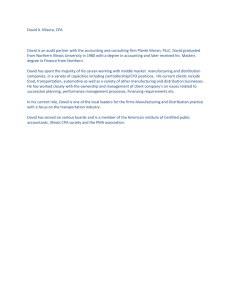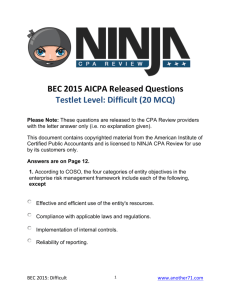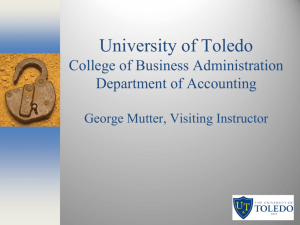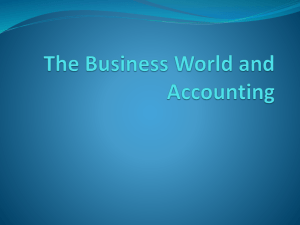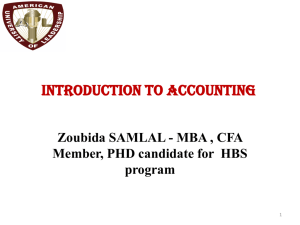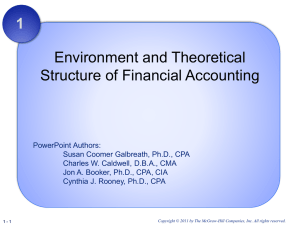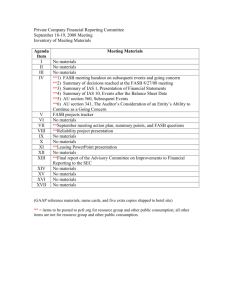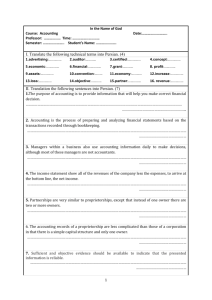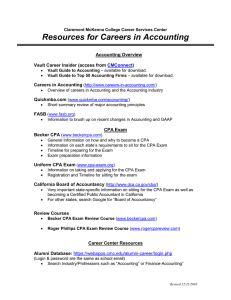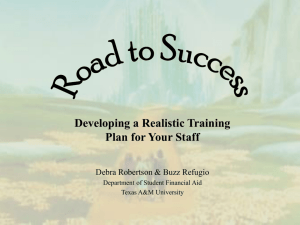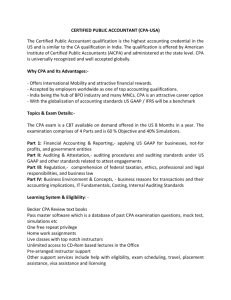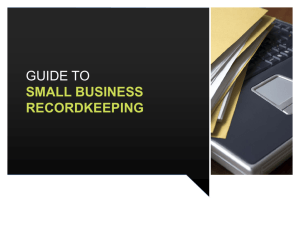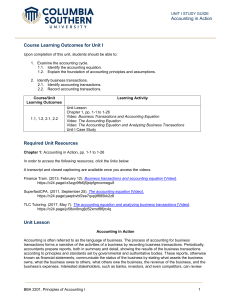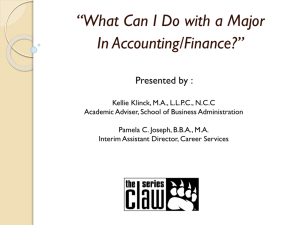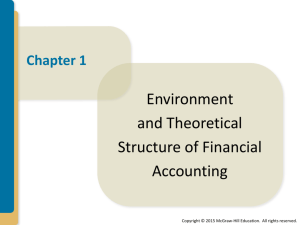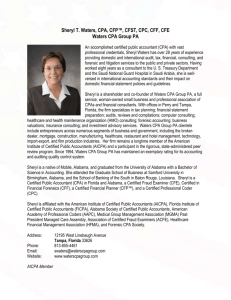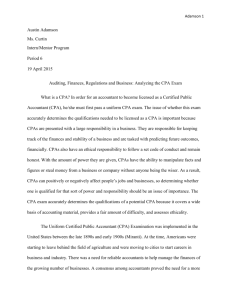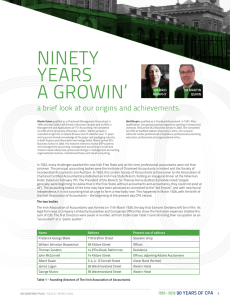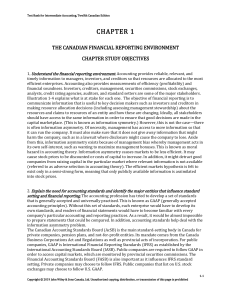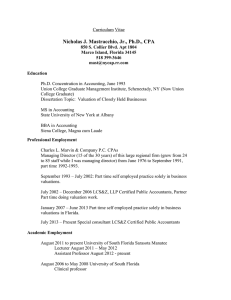Hermanson - Introduction
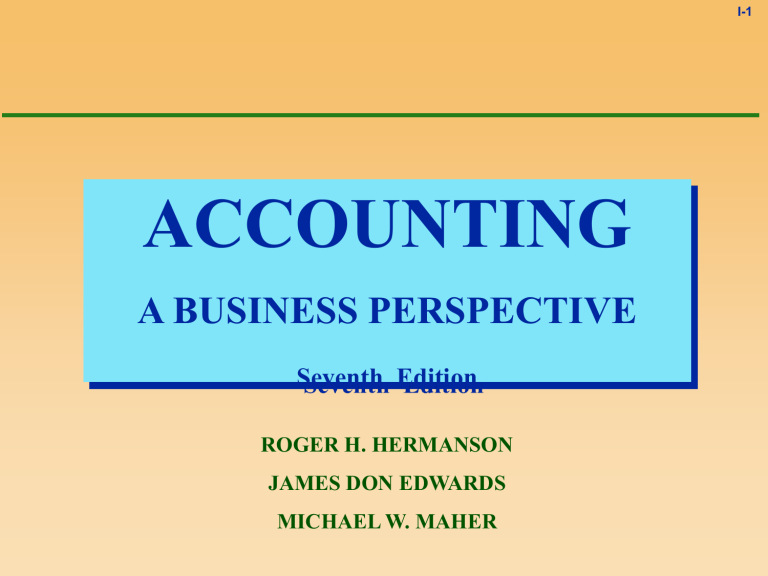
ACCOUNTING
A BUSINESS PERSPECTIVE
Seventh Edition
ROGER H. HERMANSON
JAMES DON EDWARDS
MICHAEL W. MAHER
I-1
Introduction Chapter
The Accounting
Environment
Pages 1-11
Very Broad Overview
I-2
Administration
Bring book to class.
How to take notes.
Write in your book!!
I-3
Major Challenge
What do you think is the biggest problem/challenge for most students taking introductory accounting?
The Vocabulary!
Accounting is often called “the language of business”.
This is why all business students must take this course.
I-4
Text’s Definition of Accounting
“The process of identifying, measuring, and communicating economic information to permit informed judgments and decisions by the users of the information.”
I-5
2
Rice’s Definition of Accounting
The process of:
Identifying,
Measuring,
Recording,
Classifying,
Summarizing,
Reporting, and Interpreting ...
I-6
I-7
Rice’s Definition of Accounting
… What?
Financial transactions
… For whom?
For interested users.
Who are these interested users?
Interested Users (pg. 6-7)
Customers
(Why?)
Creditors and lenders
Owners and prospective owners
Employees and their unions
(Why?)
Government units
General
Public
I-8
Accounting vs. Bookkeeping
Bookkeeping
Mechanical process
May not know why ...
Accounting
Must know theory behind why...
Should be able to apply theory to ...
I-9
Classification of Accounting Jobs
I-10
Public Accounting
Private industry
Government
Education
Public Accounting
Public Accounting Firms offer professional accounting services to clients.
Generally, the public accountant’s goal is to become a Certified Public
Accountant, or CPA.
The CPA certificate is generally considered to be required to be a
“member of the profession”
I-11
CPA Exam
National, two-day exam
Given twice a year
May and November
Given at same time in all states
Has four parts
CPA is licensed by the state
I-12
Public Accounting Services
Audit Services
Auditor’s Opinion or Report
Auditor “attests”
Only unique service
Tax Services
Competition?
Today’s emphasis?
Management Advisory/
Consulting Services
Competition?
Largest in world?
I-13
Big Six Five International
CPA Firms (pg. 4)
Arthur Andersen & Co.
Deloitte & Touche
Ernst & Young
KPMG Peat Marwick
PricewaterhouseCoopers
As of 7-1-98
I-14
Other Professional Accounting
Certifications
I-15
Management Accounting (CMA)
Internal Auditing (CIA)
See Department of Accounting Web site for important links.
Two Types of Accounting
I-16
Financial Accounting
Managerial Accounting
Financial Accounting
Generating financial statements for external users of information about the company’s:
Results of Operations
Financial Position
Inflows and Outflows of Cash
I-17
Financial Accounting
Income
Statement
Balance
Sheet
Statement of Cash
Flows
Financial
Statements must be prepared in accordance with Generally
Accepted
Accounting
Principles
(GAAP)
I-18
Generally Accepted Accounting
Principles (GAAP)
I-19
Common set of accounting rules followed by all public businesses.
Required by the Securities and Exchange
Commission (SEC)
Often required by other external stakeholders, such as
Creditors, Lenders, Vendors, Investors
Auditors make sure they have been followed
More on GAAP
Defined by the
Financial
Accounting
Standards
Board (FASB)
The FASB is the seven short fat guys (the
Gurus) who hang out in
Norwalk, CT
I-20
Managerial Accounting
Generates information for internal use which is crucial for decision making
I-21
Financial decisions
Marketing decisions Production decisions
Resource allocation decisions
Important Organizations
(pp. 8 & 9)
Financial Accounting Standards Board (FASB)
American Institute of Certified Public Accountants (AICPA)
Governmental Accounting Standards Board (GASB)
Securities and Exchange Commission (SEC)
American Accounting Association (AAA)
Financial Executives Institute (FEI)
Institute of Management Accountants (IMA)
I-22
Ethical Behavior of Accountants
Ethical conduct includes:
Obeying the profession’s
Code of
Ethics.
Doing the
“right” thing.
Obeying the laws.
Maintaining honesty and integrity.
I-23
Miscellaneous
How to Study the
Chapters in this Text
See pp. 10 & 11
I-24
END
OF
INTRO
I-25

